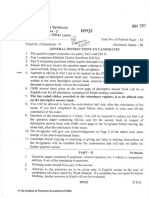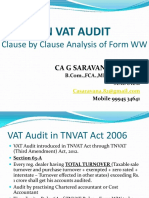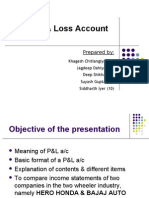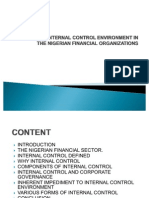0 ratings0% found this document useful (0 votes)
30 viewsAccounting Answer
Accounting Answer
Uploaded by
solomon1. The document discusses various provisions of the Companies Act, 2013 related to prospectus, interim dividends, appointment of agents, and timelines for payment of declared dividends.
2. It provides explanations and analyses of cases related to actions for deceit against directors based on prospectus, revocation of declared interim dividends, responsibilities of agents in selecting other agents, and interpretation of time periods using "from" and "to".
3. The document also discusses qualifications of internal auditors, nomination of shares, and discharge of liability of drawers of cheques not presented in reasonable time.
Copyright:
© All Rights Reserved
Available Formats
Download as PDF, TXT or read online from Scribd
Accounting Answer
Accounting Answer
Uploaded by
solomon0 ratings0% found this document useful (0 votes)
30 views9 pages1. The document discusses various provisions of the Companies Act, 2013 related to prospectus, interim dividends, appointment of agents, and timelines for payment of declared dividends.
2. It provides explanations and analyses of cases related to actions for deceit against directors based on prospectus, revocation of declared interim dividends, responsibilities of agents in selecting other agents, and interpretation of time periods using "from" and "to".
3. The document also discusses qualifications of internal auditors, nomination of shares, and discharge of liability of drawers of cheques not presented in reasonable time.
Original Description:
Accounting answer for CA
Original Title
Accounting answer
Copyright
© © All Rights Reserved
Available Formats
PDF, TXT or read online from Scribd
Share this document
Did you find this document useful?
Is this content inappropriate?
1. The document discusses various provisions of the Companies Act, 2013 related to prospectus, interim dividends, appointment of agents, and timelines for payment of declared dividends.
2. It provides explanations and analyses of cases related to actions for deceit against directors based on prospectus, revocation of declared interim dividends, responsibilities of agents in selecting other agents, and interpretation of time periods using "from" and "to".
3. The document also discusses qualifications of internal auditors, nomination of shares, and discharge of liability of drawers of cheques not presented in reasonable time.
Copyright:
© All Rights Reserved
Available Formats
Download as PDF, TXT or read online from Scribd
Download as pdf or txt
0 ratings0% found this document useful (0 votes)
30 views9 pagesAccounting Answer
Accounting Answer
Uploaded by
solomon1. The document discusses various provisions of the Companies Act, 2013 related to prospectus, interim dividends, appointment of agents, and timelines for payment of declared dividends.
2. It provides explanations and analyses of cases related to actions for deceit against directors based on prospectus, revocation of declared interim dividends, responsibilities of agents in selecting other agents, and interpretation of time periods using "from" and "to".
3. The document also discusses qualifications of internal auditors, nomination of shares, and discharge of liability of drawers of cheques not presented in reasonable time.
Copyright:
© All Rights Reserved
Available Formats
Download as PDF, TXT or read online from Scribd
Download as pdf or txt
You are on page 1of 9
Test Series: March, 2018
MOCK TEST PAPER
INTERMEDIATE (NEW): GROUP – I
PAPER – 2: CORPORATE AND OTHER LAWS
SUGGESTED ANSWERS/HINTS
1. (a) Under section 2 (70) of the Companies Act, 2013, “prospectus” means any document described or
issued as a prospectus and includes a red herring prospectus referred to in section 32 or shelf
prospectus referred to in section 31 or any notice, circular, advertisement or other document
inviting offers from the public for the subscription or purchase of any securities of a body corporate.
A prospectus is a document inviting offers from the public. The prospectus and any statement
therein has no legal binding either on the company or its directors, promoters or experts to a person
who has not purchased securities in response to it.
Since, X purchased shares through the stock exchange (open market) which cannot be said to
have bought shares on the basis of prospectus. X cannot bring action for deceit against the
directors. Hence, X will not succeed. It was also held in the case of Peek Vs. Gurney that the
above-mentioned remedy by way of damage will not be available to a person if he has not
purchased the shares on the basis of prospectus.
(b) According to section 123(3) of the Companies Act, 2013, the Board of Directors of a company may
declare interim dividend during any financial year out of the surplus in the profit and loss account
and out of profits of the financial year in which such interim dividend is sought to be declared.
Further a dividend when declared becomes a debt and a shareholder is entitled to recovery of the
same after expiry of 30 days as prescribed under Section 127 of the Companies Act, 2013. Section
2(14A) of the Act defines dividend to include interim dividend. Therefore , dividend once declared
becomes a debt and payable within 30 days of declaration.
In the present case, Perfect Limited declared an interim dividend for the second time. After
declaration, the Board of Directors decided to revoke the second interim dividen d as its financial
position was poor.
However, in view of the above, the Board of directors cannot revoke the second interim dividend.
Therefore, decision of the Board to revoke the declared 2 nd Interim dividend is invalid.
(c) According to section 194 of the Indian Contract Act, 1872, where an agent, holding an express or
implied authority to name another person to act for the principal in the business of the agency, has
named another person accordingly, such person is not a sub-agent, but an agent of the principal
for such part of the business of the agency as is entrusted to him .
Further, as per section 195, in selecting such agent for his principal, an agent is bound to
exercise the same amount of discretion as a man of ordinary prudence would exerci se in his
own case; and, if he does this, he is not responsible to the principal for the acts or negligence
of the agent so selected.
Thus, in the present case, Aman is not, but the surveyor is, responsible to Mr. Bhalla.
(d) As per the provisions of Section 9 of the General Clauses Act, 1897, in any legislation or regulation,
it shall be sufficient, for the purpose of excluding the first in a series of days or any other period of
time to use the word “from” and for the purpose of including the last in a series of days or any other
period of time, to use the word “to”.
Section127 of the Companies Act, 2013 uses the words, ‘thirty days from’. Thus, in the given
situation Excel Ltd. is required to pay declared dividend within 30 days from the date of declaration
© The Institute of Chartered Accountants of India
i.e. from 01/10/2016 to 30/10/2016. In this series of 30 days, 30/09/2016 will be excluded and last
30th day i.e. 30/10/2016 will be included.
2. (a) (i) Class of companies required to appoint Internal Auditor: Section 138 of the Companies
Act, 2013 and the Companies (Accounts) Rules, 2014 prescribes the class of companies
required to appoint Internal Auditor. According to it, following class of companies shall be
required to appoint an internal auditor or a firm of internal auditors which may be either an
individual or a partnership firm or a body corporate, namely:
1. Every listed company;
2. Every unlisted public company having –
(a) Paid up share capital of 50 crore rupees or more during the preceding financial
year; or
(b) Turnover of 200 crore rupees or more during the preceding financial year; or
(c) Outstanding loans or borrowings from banks or public financial institutions
exceeding 100 crore rupees or more at any point of time during the preceding
financial year; or
(d) Outstanding deposits of 25 crore rupees or more at any point of time during the
preceding financial year; and
3. Every private company having –
(a) Turnover of 200 crore rupees or more during the preceding financial year; or
(b) Outstanding loans or borrowings from banks or public financial institutions
exceeding 100 crore rupees or more at any point of time during the preceding
financial year.
As per the facts given in the question, Natraj Limited is an unlisted public company with the
paid up share capital of ` 80 cores during the preceding financial year with the turnover of
` 110 crores. Since, Natraj Limited fulfills one of the criteria with paid up share capital of
more than 50 crore rupees during the preceding financial year, it is mandatory for the Natraj
Limited to appoint an internal auditor for the financial year 2017-18.
(ii) Qualifications of Internal Auditor
(a) Internal Auditor shall either be a chartered accountant or a cost accountant or such other
professional as may be decided by the Board to conduct internal audit of the functions
and activities of the company.
Here, the term “Chartered Accountant” or “Cost Accountant” shall mean a “Chartered
Accountant” or a “Cost Accountant”, as the case may be, whether engaged in practice
or not.
(b) The internal auditor may or may not be an employee of the company .
(b) Nomination is a facility whereby a holder of any financial asset (bank a/c, FD, securities etc.) could
nominate the name of person who would be entitled to that financial asset in case of his or her
death. Generally, such nomination overrides any will. It is a very logical thing to do to avoid legal,
procedural tangles related to transmission at a later stage for the near and dear ones.
As per Section 72 of the Companies Act, 2013-
(1) every holder of securities of a company may, at any time, nominate, in the prescribed manner,
any person to whom his securities shall vest in the event of his death.
© The Institute of Chartered Accountants of India
(2) Where the securities of a company are held by more than one person jointly, the joint holders
may together nominate, in the prescribed manner, any person to whom all the rights in the
securities shall vest in the event of death of all the joint holders.
(3) Notwithstanding anything contained in any other law for the time being in force or in any
disposition, whether testamentary or otherwise, in respect of the securities of a company,
where a nomination made in the prescribed manner purports to confer on any person the right
to vest the securities of the company, the nominee shall, on the death of the holder of
securities or, as the case may be, on the death of the joint holders, become entitled to all th e
rights in the securities, of the holder or, as the case may be, of all the joint holders, in relation
to such securities, to the exclusion of all other persons, unless the nomination is varied or
cancelled in the prescribed manner.
(4) Where the nominee is a minor, it shall be lawful for the holder of the securities, making the
nomination to appoint, in the prescribed manner, any person to become entitled to the
securities of the company, in the event of the death of the nominee during his minority.
Thus, Mr. Mehra can nominate the shares held by him in Prema Ltd. to his son.
(c) (i) The problem as asked in the question is based on the provisions of the Negotiable Instruments
Act, 1881 as contained in Section 84. The section provides that where a che que is not
presented by the holder for payment within a reasonable time of its issue and the drawer
suffers actual damage through the delay because of the failure of the bank, he is discharged
from liability to the extent of such damage. In determining what is reasonable time, regard
shall be had to the nature of the instrument, the usage of trade and bankers, and the facts of
the particular case.
Accordingly, in the given case, the drawer is discharged from the liability to pay the amount
of cheque to B. However, B can sue against the bank for the amount of the cheque applying
the above provisions.
(ii) Person to be called as a holder: As per section 8 of the Negotiable Instruments Act, 1881
‘holder’ of a Negotiable Instrument means any person entitled in his own name to the
possession of it and to receive or recover the amount due thereon from the parties thereto.
On applying the above provision in the given cases-
(1) Yes, A can be termed as a holder because he has a right to possession and to receive
the amount due in his own name.
(2) No, X is not a ‘holder’ because to be called as a ‘holder’ he must be entitled not only to
the possession of the instrument but also to receive the amount mentioned therein.
3. (a) Issue of Further Shares: According to Section 62 (1) of the Companies Act, 2013 if at any time,
a company having a share capital proposes to increase its subscribed capital by the issue of further
shares, such shares should be offered to –
(i) the existing equity shareholders of the company as at the date of the offer, in proportion to
the capital paid up on those shares.
(ii) employees under a scheme of employees’ stock option subject to a special resolution passed
by the company and subject to such conditions as may be prescribed.
(iii) to any persons, if it is authorised by a special resolution, whether or not those persons include
the persons referred to in clause (i) or clause (ii), either for cash or for a consideration other
than cash, if the price of such shares is determined by the valuation report of a registered
valuer subject to such conditions as may be prescribed.
3
© The Institute of Chartered Accountants of India
Since, in the given case Dhyan Dairy Ltd. approached Shayam Ltd. for subscribing to the
shares of the company for its expansion and Shayam Ltd. is neither an existing equity
shareholder of the company nor an employee, Dhyan Dairy Ltd., if it is authorised by a special
resolution, may issues shares to Shayam Ltd. either for cash or for a consideration other than
cash, subject to the condition that the price of such shares is determined by the valuation
report of a registered valuer.
(b) According to section 131 of the Companies Act, 2013,
(1) Preparation of revised financial statement or revised report on the approval of Tribunal:
If it appears to the directors of a company that—
(a) the financial statement of the company; or
(b) the report of the Board,
do not comply with the provisions of section 129 or section 134, they may prepare revised
financial statement or a revised report in respect of any of the three preceding financial years
after obtaining approval of the Tribunal on an application made by the company in such form
and manner as may be prescribed and a copy of the order passed by the Tribunal shall be
filed with the Registrar:
Tribunal to serve the notice: Provided that the Tribunal shall give notice to the Central
Government and the Income tax authorities and shall take into consideration the
representations, if any, made by that Government or the authorities before passi ng any order
under this section:
Number of times of revision and recast: provided further that such revised financial
statement or report shall not be prepared or filed more than once in a financial year:
Reason for revision to be disclosed: Provided also that the detailed reasons for revision of
such financial statement or report shall also be disclosed in the Board's report in the relevant
financial year in which such revision is being made.
(2) Where copies of the previous financial statement or report have been sent out to members or
delivered to the Registrar or laid before the company in general meeting, the revisions must
be confined to—
(a) the correction in respect of which the previous financial statement or report do not
comply with the provisions of section 129 or section 134; and
(b) the making of any necessary consequential alternation.
(3) Framing of rules by the Central Government in relation to revised financial statement
or director's report: The Central Government may make rules as to the application of the
provisions of this Act in relation to revised financial statement or a revised director's report
and such rules may, in particular—
(a) make different provisions according to which the previous financial statement or report
are replaced or are supplemented by a document indicating the corrections to be made;
(b) make provisions with respect to the functions of the company's auditor in relation to the
revised financial statement or report;
(c) require the directors to take such steps as may be prescribed.
(c) “Coming into operation of enactment”: According to section 5 of the General Clauses Act, 1897,
where any Central Act has not specifically mentioned a particular date to come into force, it shall
be implemented on the day on which it receives the assent of the Governor General in case of a
© The Institute of Chartered Accountants of India
Central Acts made before the commencement of the Indian Constitution and/or, of the President in
case of an Act of Parliament.
Example: The Companies Act, 2013 received assent of President of India on 29 th August, 2013
and was notified in official gazette on 30 th August, 2013 with the enforcement of section 1 of the
Act. Accordingly, the Companies Act, 2013 came into enforcement on the date of its publication in
the Official Gazette.
(d) Difference between Interpretation and Construction- Interpretation differs from construction.
Interpretation is of finding out the true sense of any form and the construction is the drawing of
conclusion respecting subjects that lie beyond the direct expression of the text .
When the legislature uses certain words which have acquired a definite meaning over a period of
time, it must be assumed that those words have been used in the same sense.
Thus, where the Court adheres to the plain meaning of the language used by the legislature, it
would be ‘interpretation’ of the words, but where the meaning is not plain, the court has to decide
whether the wording was meant to cover the situation before the court. Here the court would be
resorting to what is called ‘construction’, however, the two terms – ‘interpretation’ and ‘construction’
– overlap each other and it is rather difficult to state where ‘interpretation’ leaves off and
‘construction’ begins.
4. (a) Section 109 of the Companies Act, 2013 provides for the demand of poll before or on the
declaration of the result of the voting on any resolution on show of hands. Accordingly law says
that:-
Before or on the declaration of the result of the voting on any resolution on show of hands, a poll
may be ordered to be taken by the Chairman of the meeting on his own motion, and shall be
ordered to be taken by him on a demand made in that behalf:-
(a) In the case a company having a share capital, by the members present in person or by proxy,
where allowed, and having not less than one-tenth of the total voting power or holding shares
on which an aggregate sum of not less than five lakh rupees or such higher amount as may
be prescribed has been paid-up; and
(b) in the case of any other company, by any member or members present in person or by proxy,
where allowed, and having not less than one tenth of the total voting power.
Withdrawal of the demand: The demand for a poll may be withdrawn at any time by the persons
who made the demand.
Hence, on the basis on the above provisions of the Companies Act, 2013:
(i) The chairman cannot reject the demand for poll subject to provision in the articles of company.
(ii) The chairman cannot reject the request of the members for withdrawing the demand of the
Poll.
(b) Section 145 of the Companies Act, 2013 provides for auditors to sign audit reports, etc. According
to this section:
(i) The person appointed as an auditor of the company shall sign the auditor’s report or sign or
certify any other document of the company in accordance with the provisions of sub -section
(2) of section 141 (i.e. in case of firm including LLP, only Chartered Accountants are
authorised to act and sign).
(ii) The qualifications, observations or comments on financial transactions or matters, which have
any adverse effect on the functioning of the company mentioned in the auditor’s report shall
be read before the company in general meeting and shall be open to inspection by any
member of the company.
© The Institute of Chartered Accountants of India
(c) Natural and grammatical meaning: Statute are to be first understood in their natural, ordinary, or
popular sense and must be construed according to their plain, literal and grammatical meaning. If
there is an inconsistency with any express intention or declared purpose of the statute, or it
inlvolves any absurdity, repugnanacy, inconsistancy, the grammatial sense must then be modified,
extended or abridgd only to avoid such an inconvenience, but no further. [(State of HP v. Pawan
Kumar(2005)]
Example: In a question before the court whether the sale of betel leaves was subject to sales tax.
In this matter the Supreme Court held that betel leaves could not be given the dictionary, technical
or botanical meaning when the ordinary and natural meaning is clear and unambiguous. Being the
word of everyday use it must be understood in its popular sense by which people are conversa nt
with it as also the meaning which the statute dealing with the matter would attribute to it. Therefore,
the sale of betel leaves was liable to sale tax. ( Ramavtar V. Assistant Sales Tax Officer, AIR 1961
SC 1325).
(d) According to section 3(18) of the General Clauses Act, 1897, ‘Document’ shall include any matter
written, expressed or described upon any substance by means of letters, figures or marks or by
more than one of those means which is intended to be used or which may be used, for the purpose
or recording that matter.
Thus,
(i) Yes, power-of-attorney is a document.
(ii) Yes, cheque upon a banker is a document.
5. (a) Yes, the Director shall be held liable for the false statements in the prospectus under sections 34
and 35 of the Companies Act, 2013. Whereas section 34 imposes a criminal punishment on every
person who authorises the issue of such prospectus, section 35 more particularly includes a
director of the company in the imposition of liability for such mis statements.
The only situations when a director will not incur any liability for mis statements in a prospectus
are as under:
(a) No criminal liability under section 34 shall apply to a person if he proves that such statement
or omission was immaterial or that he had reasonable grounds to believe, and did up to the
time of issue of the prospectus believe, that the statement was true or the inclusion or
omission was necessary.
(b) No civil liability for any mis statement under section 35 shall apply to a person if he proves
that:
(1) Having consented to become a director of the company, he withdrew his consent before
the issue of the prospectus, and that it was issued without his authority or consent; or
(2) The prospectus was issued without his knowledge or consent, and that on becoming
aware of its issue, he forthwith gave a reasonable public notice that it was issued without
his knowledge or consent.
Therefore, in the present case the director cannot hide behind the excuse that he had relied on the
promoters for making correct statements in the prospectus. He will be liable for mis statements in
the prospectus.
(b) According to section 77(1) of the Companies Act, 2013, the prescribed particulars of the charge
together with the instrument, if any by which the charge is created or evidenced, or a copy thereof
shall be filed with the Registrar within 30 days after the date of the creation of charge.
In the present case particulars of charge have not been filed within the prescribed period of 30
days.
© The Institute of Chartered Accountants of India
However, the Registrar is empowered under proviso to section 77 (1) to extend the period of 30
days by another 300 days on payment of such additional fee as may be prescribed. Taking
advantage of this provision, Mind Limited, should immediately file the particulars of charge with the
Registrar and satisfy the Registrar that it had sufficient cause, for not filing the particulars of charge
within 30 days of creation of charge.
There will be no change in the situation if the charge was created on 12 th February, 2018.
(c) According to the Section 125 of the Indian Contract Act,1872 the indemnity holder i.e., promisee
in a contract of indemnity, acting within the scope of his authority, is entitled to recover from the
promisor:
(1) all damages which he may be compelled to pay in any suit in respect of any matter to which
the promise to indemnify applies;
(2) all costs which he may be compelled to pay in any such suit, if in bringing or defending it, he
did not contravene the orders of the promisor, and acted as it would have been prudent for
him to act in the absence of any contract of indemnity, or if the promisor authorised him to
bring or defend the suit.
(3) all sums which he may have paid under the terms of any compromise of any such suit, if the
compromise was not contrary to the orders of the promisor, and was one which it would have
been prudent for the promisee to make in the absence of any contract of indemnity, or if the
promisor authorised him to compromise the suit.
Section 125 is by no means exhaustive, which deals only with his rights in the event of his being
sued. The indemnity holder has other rights besides those mentioned above. If he has incurred a
liability and that liability is absolute he is entitled to call upon his indemnifier to save him from that
liability and to pay it off.
(d) The problem is based on the provision of Section 42 of the Negotiable Instruments Act, 1881. In
case a bill of exchange is drawn payable to the drawer’s order in a fictitious name and is endorsed
by the same hand as the drawer’s signature, it is not permissible for the acceptor to allege as
against the holder in due course that such name is fictitious. Accordingly, in the i nstant case, Y
cannot avoid payment by raising the plea that the drawer (Z) is fictitious. The only condition is that
the signature of Z as drawer and as endorser must be in the same handwriting .
6. (a) According to Section 63 of the Companies Act, 2013, a company may issue fully paid-up bonus
shares to its members, in any manner whatsoever, out of -
(i) its free reserves;
(ii) the securities premium account; or
(iii) the capital redemption reserve account.
Provided that no issue of bonus shares shall be made by capitalising reserves created by the
revaluation of assets.
Conditions for issue of Bonus Shares: No company shall capitalise its profits or reserves for the
purpose of issuing fully paid-up bonus shares, unless—
(i) it is authorised by its Articles;
(ii) it has, on the recommendation of the Board, been authorised in the general meeting of the
company;
(iii) it has not defaulted in payment of interest or principal in respect of fixed deposits or debt
securities issued by it;
© The Institute of Chartered Accountants of India
(iv) it has not defaulted in respect of payment of statutory dues of the employees, such as,
contribution to provident fund, gratuity and bonus;
(v) the partly paid-up shares, if any outstanding on the date of allotment, are made fully paid-up;
(f) it complies with such conditions as may be prescribed.
But the company has to ensure that the bonus shares shall not be issued in lieu of dividend.
Hence, after following the above compliances on issuing bonus shares under the Companies Act,
2013, Shree Ltd. may proceed for a bonus issue of 1 share for every 2 shares held by the existing
shareholders.
(b) (1) Rectification by Central Government in register of charges: Section 87 of the Companies
Act, 2013 empowers the Central Government to make rectification in register of charges.
According to the provision-
(1) The Central Government on being satisfied that—
(i) (a) the omission to file with the Registrar the particulars of any charge
created by a company or any charge subject to which any property has been
acquired by a company or any modification of such charge; or
(b) the omission to register any charge within the time required under this
Chapter or the omission to give intimation to the Registrar of the payment or
the satisfaction of a charge, within the time required under this Chapter; or
(c) the omission or mis-statement of any particular with respect to any such
charge or modification or with respect to any memorandum of satisfaction or
other entry made in pursuance of section 82 or section 83,
- was accidental or due to inadvertence or some other sufficient cause or it is
not of a nature to prejudice the position of creditors or shareholders of the
company; or
(ii) on any other grounds, it is just and equitable to grant relief,
- it may on the application of the company or any person interested and on
such terms and conditions as it may seem to the Central Government just and
expedient, direct that the time for the filing of the particulars or for the
registration of the charge or for the giving of intimation of payment or
satisfaction shall be extended or, as the case may require, that the omission
or mis-statement shall be rectified.
(2) Where the Central Government extends the time for the registration of a charge, the
order shall not prejudice any rights acquired in respect of the property concerned before
the charge is actually registered.
(2) Condonation of delay and rectification of register of charges.- (1) Where the instrument
creating or modifying a charge is not filed within a period of 300 hundred days from the date
of its creation (including acquisition of a property subject to a charge) or modification and
where the satisfaction of the charge is not filed within 30 days from the date on which such
payment of satisfaction, the Registrar shall not register the same unless the delay is condoned
by the Central Government.
(2) The application for condonation of delay and for such other matters covered in sub-
clause (a), (b) and (c) of clause (i) of sub-section (1) of section 87 of the Act shall be
filed with the Central Government along with the fee.
(3) The order passed by the Central Government under section 87(1) of the Act shall be
required to be filed with the Registrar along with the fee as per the conditions stipulated
8
© The Institute of Chartered Accountants of India
in the said order.
(c) According to section 133 of the Indian Contract Act, 1872, where there is any variance in the terms
of contract between the principal debtor and creditor without surety’s consent, it would discharge
the surety in respect of all transactions taking place subsequent to such variance.
Thus, if the creditor makes any variance (i.e. change in terms) without the consent of the surety,
then surety is discharged as to the transactions subsequent to the change. In the instant case Yash
is liable as a surety for the loss suffered by the bank due to misappropriation of cash by Shashank
during the first nine months but not for misappropriations committed after the reduction in salary.
(d) According to section 45A of the Negotiable Instruments Act, 1881, where a bill of exchange has
been lost before it is overdue,
the person who was the holder of it may apply
to the drawer to give him another bill of the same tenor,
giving security to the drawer, if required,
to indemnify him against all persons whatever in case the bill alleged to have been lost shall
be found again.
If the drawer on request as aforesaid refuses to give such duplicate bill, he may be compelled to
do so.
© The Institute of Chartered Accountants of India
You might also like
- Student Loan Debt Research PaperDocument10 pagesStudent Loan Debt Research Paperapi-406088275No ratings yet
- SEC Whistleblower Submission No. TCR1458580189411 - Mar-21-2016Document39 pagesSEC Whistleblower Submission No. TCR1458580189411 - Mar-21-2016Neil GillespieNo ratings yet
- © The Institute of Chartered Accountants of IndiaDocument8 pages© The Institute of Chartered Accountants of IndiaswfgrnrNo ratings yet
- MTP 12 15 Answers 1696595420Document8 pagesMTP 12 15 Answers 1696595420harshallahotNo ratings yet
- Law S2 AnswersDocument7 pagesLaw S2 Answerskomalchandwani.dnlNo ratings yet
- Answer PDFDocument7 pagesAnswer PDFManjunath ANo ratings yet
- MTP 17 49 Answers 1709995807Document11 pagesMTP 17 49 Answers 1709995807Looney ApacheNo ratings yet
- Ad 24 CA INTER Law Mock II Exam Dt.20.04.24 SolutionDocument11 pagesAd 24 CA INTER Law Mock II Exam Dt.20.04.24 SolutionYash SawantNo ratings yet
- Paper2 SolDocument8 pagesPaper2 SolHARSHITH C NNo ratings yet
- Nov 23 MTP-1 (A)Document10 pagesNov 23 MTP-1 (A)luciferNo ratings yet
- MTP 26 49 Answers 1722429273Document8 pagesMTP 26 49 Answers 1722429273pianoplay1221No ratings yet
- Law S1 AnswersDocument10 pagesLaw S1 Answerskomalchandwani.dnlNo ratings yet
- MTP 3 15 Answers 1680935509Document8 pagesMTP 3 15 Answers 1680935509Umar MalikNo ratings yet
- CA Inter Law A MTP 2 May 2024 Castudynotes ComDocument9 pagesCA Inter Law A MTP 2 May 2024 Castudynotes Comabcdefgh1234567890101112No ratings yet
- Legal Spects of Business PresentationDocument55 pagesLegal Spects of Business PresentationHIMANI UPADHYAYNo ratings yet
- © The Institute of Chartered Accountants of IndiaDocument8 pages© The Institute of Chartered Accountants of IndiaKartik GuptaNo ratings yet
- 70096bos210422 Inter P2aDocument7 pages70096bos210422 Inter P2aSakshi KhandelwalNo ratings yet
- MTP 19 49 Answers 1712387474Document9 pagesMTP 19 49 Answers 1712387474Nitin KumarNo ratings yet
- Test 4 - Answer Key-1Document4 pagesTest 4 - Answer Key-1rcbprajjuNo ratings yet
- Paper 2 Corporate and Other Laws Ans Series 2 PDFDocument8 pagesPaper 2 Corporate and Other Laws Ans Series 2 PDFMEGHANANo ratings yet
- Prospectus Under The Companies ActDocument22 pagesProspectus Under The Companies ActKinshuk BaruaNo ratings yet
- Doctrine of Constructive Notice Doctrine of Indoor ManagementDocument20 pagesDoctrine of Constructive Notice Doctrine of Indoor ManagementRajeev MehtaNo ratings yet
- 2-Sep Chap 3,6,10,14 AnsDocument9 pages2-Sep Chap 3,6,10,14 AnsAyushNo ratings yet
- Solution - Test CH 3Document4 pagesSolution - Test CH 3Anil ReddyNo ratings yet
- Main Centre-59 Jatindra Mohan Avenue Shobhabazar Kolkata-700005Document10 pagesMain Centre-59 Jatindra Mohan Avenue Shobhabazar Kolkata-700005DummyNo ratings yet
- Day 12 - Taxguru in-IBBI Fast Track Insolvency Resolution Process For Corporate Persons Regulations 2017Document22 pagesDay 12 - Taxguru in-IBBI Fast Track Insolvency Resolution Process For Corporate Persons Regulations 2017Naina MathewNo ratings yet
- IBBI Voluntary LiquidationDocument40 pagesIBBI Voluntary LiquidationopparasharNo ratings yet
- CLP - May-June - 2011Document28 pagesCLP - May-June - 2011xodic49847No ratings yet
- Cost AuditorDocument16 pagesCost Auditortusharpandey110094No ratings yet
- Ca Inter NotesDocument9 pagesCa Inter NotesSakshi KhandelwalNo ratings yet
- UNIT 2 Company LawDocument34 pagesUNIT 2 Company Lawathought60No ratings yet
- Ilovepdf Merged PDFDocument536 pagesIlovepdf Merged PDFchandraNo ratings yet
- Allotment of SecuritiesDocument9 pagesAllotment of SecuritiesADAPA KAVYA AMULYA SREENo ratings yet
- Cgble Long TheoryDocument17 pagesCgble Long Theoryuroojfatima21299No ratings yet
- CMA Final Law Super 30 - Dec 2023Document23 pagesCMA Final Law Super 30 - Dec 2023rehanrahman88896No ratings yet
- PROSPECTUSDocument7 pagesPROSPECTUSrohanukharde23No ratings yet
- Corporate AccountingDocument17 pagesCorporate AccountingArmaan GuptaNo ratings yet
- ProspectusDocument17 pagesProspectusGopesh Dwivedi67% (3)
- Raising of Funds Through Compulsorily Convertible Debentures - Taxguru - inDocument4 pagesRaising of Funds Through Compulsorily Convertible Debentures - Taxguru - inCloxan India Pvt LtdNo ratings yet
- Concept Understanding of Prospectus of Company Under Companies ActDocument8 pagesConcept Understanding of Prospectus of Company Under Companies ActNikhilNo ratings yet
- DebentureDocument31 pagesDebentureSaubhagyaNo ratings yet
- Typed Company Law 2Document18 pagesTyped Company Law 2bazard2124No ratings yet
- Essentials For A Document To Be Called As A Prospectus: Section 2 (70Document9 pagesEssentials For A Document To Be Called As A Prospectus: Section 2 (70manjushreeNo ratings yet
- Consolidated Material (Not Yet Finalised)Document137 pagesConsolidated Material (Not Yet Finalised)pujitha vegesnaNo ratings yet
- Prospectus-Converted 1Document7 pagesProspectus-Converted 1Mallika GuptaNo ratings yet
- Suggested Answers of Company Law June 2019 Old Syl-Executive-RevisionDocument15 pagesSuggested Answers of Company Law June 2019 Old Syl-Executive-RevisionjesurajajosephNo ratings yet
- Corporate Veil in IndiaDocument26 pagesCorporate Veil in IndiaFaisal AshfaqNo ratings yet
- Unit 3 - Documentation Subsequent To IncorporationDocument4 pagesUnit 3 - Documentation Subsequent To Incorporationmehul2812mittalNo ratings yet
- CA Inter RTP Complied Nov23-May 20Document475 pagesCA Inter RTP Complied Nov23-May 20ronex45326No ratings yet
- 75571bos61147 p6Document33 pages75571bos61147 p6Rajesh SharmaNo ratings yet
- Ep Os Module 1 Dec 20Document93 pagesEp Os Module 1 Dec 20Monika SinghNo ratings yet
- CMA Final Super 75 - Dec 2024Document56 pagesCMA Final Super 75 - Dec 2024singleme881999No ratings yet
- PROSPECTUS - Contents and Liability For MisrepresentationDocument14 pagesPROSPECTUS - Contents and Liability For MisrepresentationTarun PratapNo ratings yet
- Company Law MootDocument15 pagesCompany Law Moot329.NausheenNo ratings yet
- Prospectus and Allotment of SecuritiesDocument39 pagesProspectus and Allotment of SecuritiesLogesh JanagarajNo ratings yet
- November, 2017 - Company LawDocument16 pagesNovember, 2017 - Company LawHarshvardhan MelantaNo ratings yet
- ProspectusDocument17 pagesProspectusPallavi Varshney100% (1)
- © The Institute of Chartered Accountants of IndiaDocument8 pages© The Institute of Chartered Accountants of Indiaamanaggarwal1708No ratings yet
- A) Incorpoation and Its EffectsDocument5 pagesA) Incorpoation and Its EffectsMatin Fawwaz JuniorNo ratings yet
- Company Law AssignmentDocument12 pagesCompany Law AssignmentAdityaNo ratings yet
- CS Executive Companies Act 2013 NotesDocument15 pagesCS Executive Companies Act 2013 NotesuondvafwNo ratings yet
- Draft of Agreement For Sale of A HouseDocument3 pagesDraft of Agreement For Sale of A HousesolomonNo ratings yet
- Petitoin Format - F (Mutual Consent)Document3 pagesPetitoin Format - F (Mutual Consent)solomonNo ratings yet
- Petition Format - D (Custody)Document9 pagesPetition Format - D (Custody)solomon0% (1)
- Ollga Case Facts of The CaseDocument18 pagesOllga Case Facts of The CasesolomonNo ratings yet
- Problems With The Advocates (Amendment) Bill, 2017: Pallavi MohpalDocument3 pagesProblems With The Advocates (Amendment) Bill, 2017: Pallavi MohpalsolomonNo ratings yet
- Petition Format - A B C (Adoption and Maintenance)Document9 pagesPetition Format - A B C (Adoption and Maintenance)solomon0% (1)
- Petition Format - A B C (Adoption and Maintenance)Document9 pagesPetition Format - A B C (Adoption and Maintenance)solomon0% (1)
- The Functionaries Under The Code of Criminal Procedure, 1973 PDFDocument1 pageThe Functionaries Under The Code of Criminal Procedure, 1973 PDFsolomonNo ratings yet
- © The Institute of Chartered Accountants of IndiaDocument14 pages© The Institute of Chartered Accountants of IndiasolomonNo ratings yet
- Vidya Sagar: Mock Test - AUDITING AND ASSURANCE (May 2018)Document22 pagesVidya Sagar: Mock Test - AUDITING AND ASSURANCE (May 2018)solomonNo ratings yet
- Bluetooth Keyboard For Ipad Kb-B1Document2 pagesBluetooth Keyboard For Ipad Kb-B1solomon0% (1)
- 01 RT I ApplicationDocument2 pages01 RT I ApplicationsolomonNo ratings yet
- Auditing AssuranceDocument16 pagesAuditing AssurancesolomonNo ratings yet
- VAT ERROR Madurai 19092015 Session VDocument40 pagesVAT ERROR Madurai 19092015 Session VsolomonNo ratings yet
- GST State ActDocument27 pagesGST State ActsolomonNo ratings yet
- Non Current AssetsDocument44 pagesNon Current AssetsSandee Angeli Maceda Villarta100% (1)
- Abjamesola Tailoring Services Case StudyDocument17 pagesAbjamesola Tailoring Services Case StudyTintin Tao-onNo ratings yet
- Psychological LevelsDocument7 pagesPsychological Levelskhalidnuruddin8No ratings yet
- Mcdonald'S Corporation: United States Securities and Exchange Commission FORM 10-QDocument1 pageMcdonald'S Corporation: United States Securities and Exchange Commission FORM 10-QSaidal MohmandNo ratings yet
- Rue I: Leder of Comment NoDocument1 pageRue I: Leder of Comment NodreaammmNo ratings yet
- New Zealand Currency - Notes and CoinsDocument20 pagesNew Zealand Currency - Notes and CoinsChips ZedNo ratings yet
- BK Fee SchedulesDocument1 pageBK Fee SchedulesSince 1990 BK AND MOTIONS AT YAHOO COMNo ratings yet
- Ch5 Operating & Financial LevDocument31 pagesCh5 Operating & Financial LevKristina GarciaNo ratings yet
- Horizontal & Tend Analysis of The Financial StatementsDocument3 pagesHorizontal & Tend Analysis of The Financial StatementsumeshNo ratings yet
- PreferenceSharesDocument1 pagePreferenceSharesTiso Blackstar GroupNo ratings yet
- GARCIA Vs LIM CHU SINGDocument1 pageGARCIA Vs LIM CHU SINGJoannaNo ratings yet
- Income Taxation Rev 2Document22 pagesIncome Taxation Rev 2Angel UrbanoNo ratings yet
- The Great Margin CallDocument33 pagesThe Great Margin CallJock WolfhardNo ratings yet
- KardexDocument107 pagesKardexFeherMadalinNo ratings yet
- EthicsDocument17 pagesEthicsRajesh SharmaNo ratings yet
- 8960 Equity Research Methodology 112603Document2 pages8960 Equity Research Methodology 112603Ashish NirajNo ratings yet
- Currency DerivativesDocument12 pagesCurrency DerivativesNazneen100% (2)
- Comprehensive Examinations 2 (Part II)Document4 pagesComprehensive Examinations 2 (Part II)Yander Marl BautistaNo ratings yet
- Assessing A New Venture's Financial Strength and ViabilityDocument35 pagesAssessing A New Venture's Financial Strength and ViabilityBuraq KhanNo ratings yet
- PandL Account Presentation - FinalDocument21 pagesPandL Account Presentation - Finalapi-3712367No ratings yet
- 4529202Document4 pages4529202siyaNo ratings yet
- 25 Delpher Trades v. IACDocument2 pages25 Delpher Trades v. IACASGarcia24No ratings yet
- VivaDocument29 pagesVivaA. ShanmugamNo ratings yet
- Labuan PyqDocument8 pagesLabuan PyqNuratika Mat SaatNo ratings yet
- Security Analysis and Portfolio ManagementDocument12 pagesSecurity Analysis and Portfolio Management75 kunal kumarNo ratings yet
- BSP Reaction PaperDocument2 pagesBSP Reaction PaperMarvin Omaque50% (2)
- Company Law - Insider Trading in IndiaDocument10 pagesCompany Law - Insider Trading in IndiaShubhanshu YadavNo ratings yet
- Internal Control PPT 2Document30 pagesInternal Control PPT 2Olabanjo Shefiu Olamiji100% (1)







































































































